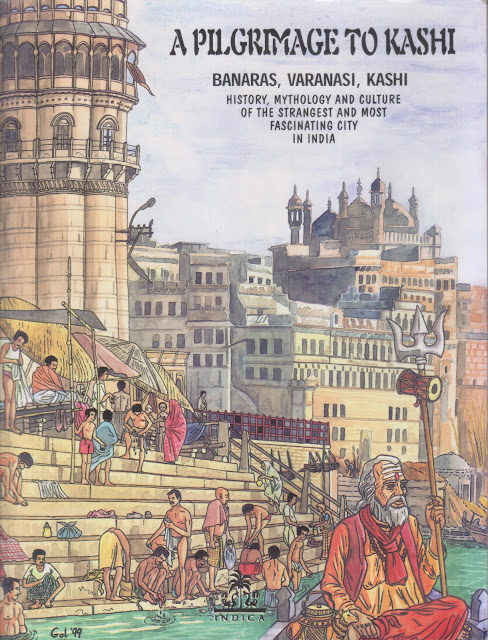A journey to Banaras' past
A Pilgrimage to Kashi
Banaras, Varanasi, Kashi
History, Mythology and Culture of the Strangest and the most Fascinating city in India
By: Gol
Publisher: Indica Books
First edition: 1999
ISBN: 81-86569-14-6
This book talks about the glory of Banaras' past and also (in a way, towards the end) posits its place in our country today. Banaras and country of the time when the book was published. I make this distinction as a lot has changed since. I read this book towards end of 2021 and beginning of 2022 as Banaras is host to state driven construction action of gargantuan proportions and a media driven tourism spree.
The images in the book are vivid and showcase exceptional familiarity with Banaras and its people besides, of course, a very high degree of skill in the craft. Images depicting the Aadi Keshav temple stand out as does the one where Dilip is shown on a chair with folded legs while his mother serves food to others!
The text captures the essence of the town. It talks of Banaras in a simple manner - not easy for sure - without falling prey to clichés. From the chaos on the streets to the ignorance of our youth. From the deeply ingrained and ages old biases of class and caste to our quintessential love for jobs and the fear of losing them. The book captures these and a lot else succinctly.
Banaras is about stories. This book tells us stories about Banaras' past. And this is a place where past goes back long. Very long. Banaras is also about multiple truths and this book repeatedly presents multiple perspectives on the town.
The book also takes a very clear pro Hindu and anti Muslim stand. Neither nuanced nor pretentious. In this it could gel well with the narratives dished out during 2021 - 2022.
Towards the end the book has a fascinating time-line - categorized into 'periods'. Few lines which struck:
Ancient : 9th Century, Date of the last layer of the excavation at Rajghat
Medieval : 1656-57, Dara Shikoh translated the Upanishads into Persian with the help of 150 pandits of Varanasi
Modern : 1862, Opening of rail link between Mughalsarai and Banaras
Post Independence : 1982, Opening of the palaeographical museum at Sarnath
Three lines that resonated:
- In Banaras you cannot separate the sacred from the profane
- Not only saints, the town is also full of crooks
- Banarasi paan, the best of India and one of life's great pleasures
Two questions that arose:
- Did India not have an industrial base way before the 19th Century?
- Did Hindi exist during Tulsi Das' time?
One line on the book:
- Get it to know Banaras better


Comments
Post a Comment